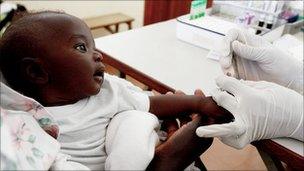Malaria vaccine trial raises hope
- Published

Malaria is caused by a parasite
A malaria vaccine has shown promising results in a clinical trial in Africa.
Infants given the prototype vaccine had about half the risk of getting malaria compared with those who did not receive the jab, say researchers.
The vaccine, known as RTS,S, is one of two experimental malaria vaccines being tested around the world.
More than 15,000 children aged under 18 months took part in the year-long study, published in The New England Journal of Medicine , external.
The trial was conducted in seven African countries on two groups of children - newborns aged six-12 weeks - and babies aged five-17 months.
One year on, there were about half the number of cases of malaria in the older group of children given the vaccine, compared with those in a control group who received vaccines against other illnesses.
"These data bring us to the cusp of having the world's first malaria vaccine," said Andrew Witty, chief executive of the British pharmaceutical company, GSK, which developed the vaccine alongside the non-profit PATH Malaria Vaccine Initiative.
'Burden'
The international team involved dozens of scientists in Africa and also the United States and Europe.
The researchers wrote in The New England Journal of Medicine, external: "These initial results show that RTS,S/AS01 reduces malaria by half in children aged five-17 months during the 12 months after vaccination and that it has the potential to have an important impact on the burden of malaria in young African children."
Results in the younger infants are still being assessed.
Global health experts say the vaccine is less effective than others against common infections like polio and measles, and it is not yet clear how much it will cost.
Tsiri Agbenyega, a principal investigator in the vaccine trials in Ghana, said: "We would have wished that we could wipe it out, but I think this is going to contribute to the control of malaria rather than wiping it out."
Each year, about 225 million people get malaria, with about 800,000 deaths, mainly in African children.
GlaxoSmithKline's Andrew Witty lauded the work as an "incredible scientific achievement"
The World Health Organization said on Monday that there had been remarkable recent progress to combat the disease, with a nearly 20% fall in the number of deaths worldwide in the past 10 years.
A preliminary trial of another potential vaccine recently revealed promising results.
The trial was designed to test safety, but researchers found that 45 children given the MSP3 vaccine had high levels of protection.
The results of the Burkina Faso trial were also published in The New England Journal of Medicine, external.
The RTS,S study was funded by GSK and the PATH Malaria Vaccine Initiative, assisted by a grant from the Bill and Melinda Gates Foundation.
- Published18 October 2011
- Published18 October 2011
- Published21 September 2011
- Published18 October 2011